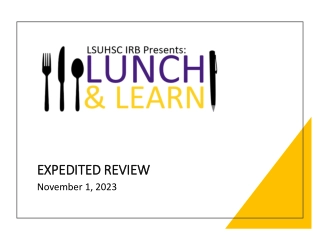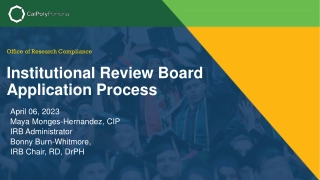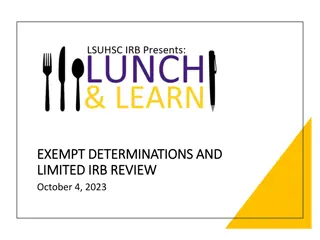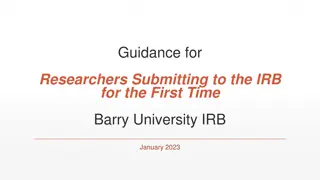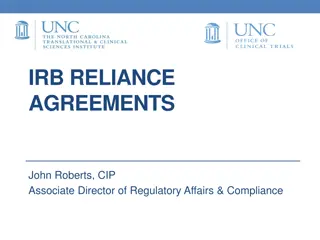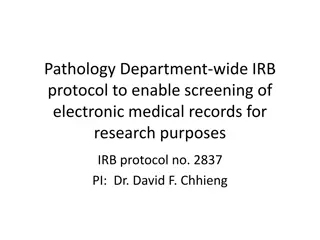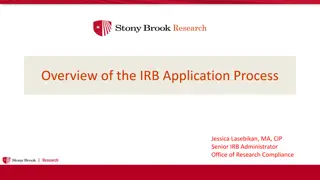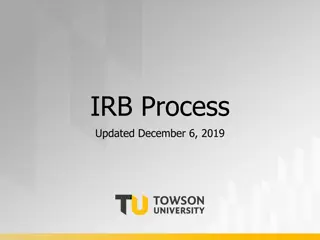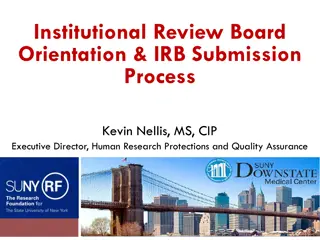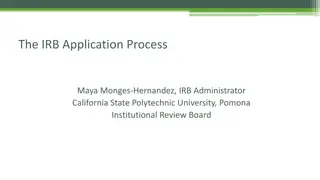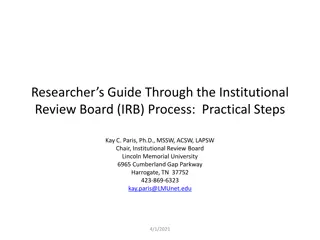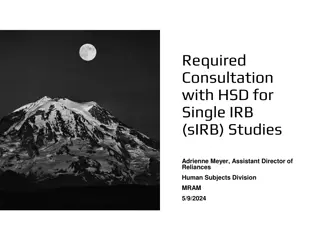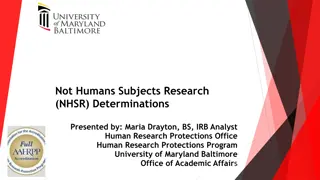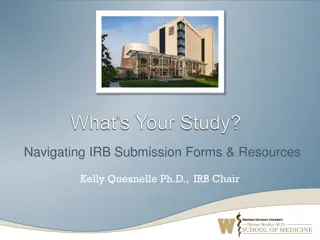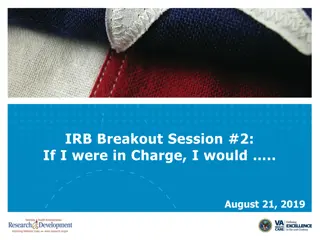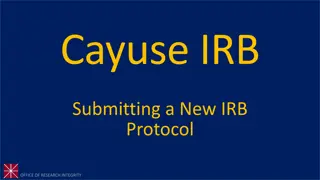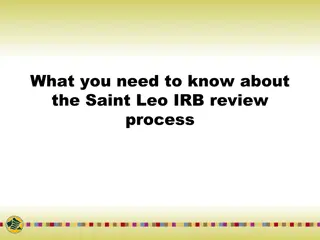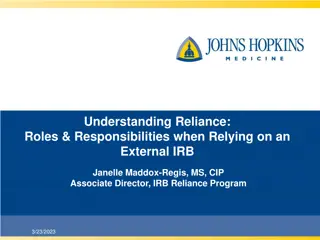Understanding IRB Applications in Research Studies
Exploring different types of research and IRB applications in academic studies, including processes related to contact registries, data/tissue banks, and consent management. The content provides insights into engaging specific populations for future research, collecting and storing clinical data, utilizing pre-existing registries, and the importance of informed consent in research activities.
Download Presentation

Please find below an Image/Link to download the presentation.
The content on the website is provided AS IS for your information and personal use only. It may not be sold, licensed, or shared on other websites without obtaining consent from the author. Download presentation by click this link. If you encounter any issues during the download, it is possible that the publisher has removed the file from their server.
E N D
Presentation Transcript
Types of Research Types of IRB Applications
Lets Play Jeopardy! Time for Your Review Go to the Bank Fast Lane I ve Got Friends 200 200 200 200 400 400 400 400 600 600 600 600
Go to the Bank for 200 You have a population of interest (e.g., women who have been diagnosed with breast cancer) that you would like to contact for future studies. Check Your Answer Check Your Answer
Contact Registry IRB Application type: Contact Registry (http://irb.ufl.edu/wp-content/uploads/Banks.pdf) ICF see http://irb.ufl.edu/irb01/forms/forms-2-2.html, go to Informed Consent forms with HIPAA -> go to Contact Registry only ICF Go Back to Categories
Go to the Bank for 400 You want to collect and store patient clinical data and/or tissues (including serum, plasma, saliva, biopsies) for future research use. Check Your Answer
Data / Tissue Bank Data / Tissue Bank (http://irb.ufl.edu/wp-content/uploads/Banks.pdf) ICF see http://irb.ufl.edu/irb01/forms/forms-2-2.html, go to Informed Consent forms with HIPAA -> go to Tissue/Data Bank ICF (banks conducted at UF/Shands) Please note! Contact Registry and Tissue/Data Bank IRBs are not the studies themselves. You must write separate IRBs for studies that use a contact registry to recruit patients, or that use samples/data from the bank for analysis. Go Back to Categories
Go to the Bank for 600 You have a population of interest (e.g., women who have been diagnosed with breast cancer) that you would like to contact for future studies, and you want to use a pre-existing contact registry that UF runs. Check Your Answer
Consent2Share Use Consent2Share (note not available in most of Jacksonville yet) http://irb.ufl.edu/wp-content/uploads/Consent2Share-Study-Subject-Recruitment.pdf Go Back to Categories
Time for your Review for 200 You and a resident you mentor are writing a case report. Check Your Answer
Case Report http://irb.ufl.edu/wp-content/uploads/Case-Reports.pdf If 3 or less patients, then UF IRB approval is not required. If more than 3 patients, then it constitutes research and IRB approval is required. As an aside, some journals require patient permission for case reports. Go Back to Categories
Time for your Review for 400 You and a fellow you mentor are writing a review of medical therapy for heart failure, including clinical considerations and recent research advances. Check Your Answer
Clinical and/or Research Review Typically, not an IRB matter, as long as the review is of published articles and no new data analysis or protected health information is involved. Go Back to Categories
Time for your Review for 600 You are on a committee and were volunteered to do a systematic review and meta-analysis. Check Your Answer
Systematic Review and Meta-Analysis See answer for clinical review if it s a systematic review ONLY. If also doing a meta-analysis an IRB application may be required (would likely be an exempt or non-human subjects research application) depending on the source(s) of the data you are synthesizing. Go Back to Categories
Fast Lane for 200 You are conducting an observational study of a new resident educational technique. Check Your Answer
What is exempt research Exempt = human subjects research that is exempt from IRB review http://irb.ufl.edu/wp-content/uploads/Exempt-Submissions.pdf and https://www.research.uci.edu/compliance/human-research-protections/docs/categories-of- exempt-human-subjects-research.pdf Go Back to Categories
Fast Lane for 400 You want to look at data from the Thousand Genomes Project, analyze it, and write a paper. Check Your Answer
What is non-human research http://irb.ufl.edu/wp-content/uploads/Non-Human-Research.pdf Research that does not involve human subjects. Examples could include data obtained from another source (not directly from the patient or UF) that is totally anonymous (e.g., WHO Global Repository Datasets) or that is coded so that you, the researcher, could NEVER have access to any identifiable data/tissue. Do I have to submit non-human research to the IRB? Yes, it is UF policy that the IRB will make the determination if your medical research it meets the definition of non-human research. Go Back to Categories
Fast Lane for 600 You want to measure the response to magnesium infusions in patients with severe migraines, who would be getting the magnesium anyway as their standard of care. Check Your Answer
What is expedited research? Expedited = Human Subjects Research that involves no more than minimal risk to human subjects. What is minimal risk? The probability and magnitude of harm or discomfort anticipated in the research are not greater in and of themselves than those ordinarily encountered in daily life or during the performance of routine physical or psychological examinations or tests. http://irb.ufl.edu/wp-content/uploads/Expedited-Submissions.pdf Common FAQ: Does expedited mean I don t need to obtained informed consent? Not necessarily. Your study may fit the requirements for waiver of informed consent, or it may require informed consent. Go Back to Categories
Ive Got Friends for 200 Catheter-associated UTIs are bad! You want to decrease the incidence of CAUTIs on your unit, so you implemented an standardized educational tool for nurses. You want to measure the incidence of CAUTIs before and after the educational tool. Check Your Answer
What is QI Is this QI or is this research? http://irb.ufl.edu/wp-content/uploads/Quality-vs-Research.pdf Unfortunately, there is no regulatory definition of QI. This example above is QI. It is a systematic, data-guided activity designed to bring about immediate or nearly immediate improvements in health care delivery. Do I submit my QI project to the IRB? No, you submit it to QIPR https://qipr.ese.ufhealth.org/approver/ What if I still don t know if my work is QI or Research? Fill out the QA vs Research form located in http://irb.ufl.edu/wp-content/uploads/Quality-vs-Research.pdf and send to the IRB Chair Dr. Iafrate (iafrate@ufl.edu) Go Back to Categories
Ive Got Friends for 400 I have a colleague at another university with the same research interests and we want to do a study together. Check Your Answer
What is a Federal Wide Assurance? Is your colleague at another University or unaffiliated with an institution that has a Federal Wide Assurance (FWA)? http://irb.ufl.edu/wp-content/uploads/Guideline-Unaffiliated-Investigators.pdf In general, most faculty work with investigators at another institution with an IRB. The unaffiliated investigator guideline therefore does NOT apply to them because that institution likely has an FWA. You can of course still collaborate and do studies with other institutions, but the IRB structure, data transfer/use agreements, etc., vary based on the type of study and the type of funding. In that case, consulting with the IRB is advised! Go Back to Categories
Ive Got Friends for 600 I still have questions, what do I do? Check Your Answer
Ask! You can visit the IRB website (http://irb.ufl.edu/irb01.html), email IRB-01 (https://uf.tfaforms.net/356), or locally email Dr. Wajeeh Bajwa (Wajeeh.Bajwa@jax.ufl.edu). This document is a guide and does not cover every situation/study. When in doubt, consult the IRB! Go Back to Categories


